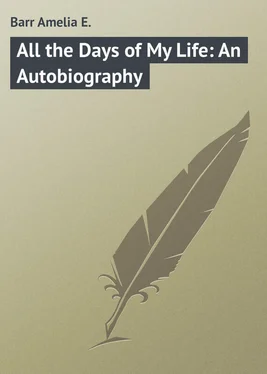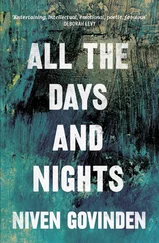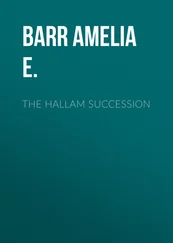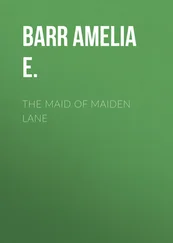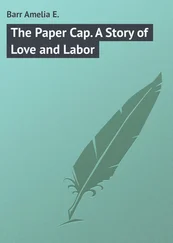Amelia Barr - All the Days of My Life - An Autobiography
Здесь есть возможность читать онлайн «Amelia Barr - All the Days of My Life - An Autobiography» — ознакомительный отрывок электронной книги совершенно бесплатно, а после прочтения отрывка купить полную версию. В некоторых случаях можно слушать аудио, скачать через торрент в формате fb2 и присутствует краткое содержание. Жанр: foreign_prose, foreign_language, на английском языке. Описание произведения, (предисловие) а так же отзывы посетителей доступны на портале библиотеки ЛибКат.
- Название:All the Days of My Life: An Autobiography
- Автор:
- Жанр:
- Год:неизвестен
- ISBN:нет данных
- Рейтинг книги:5 / 5. Голосов: 1
-
Избранное:Добавить в избранное
- Отзывы:
-
Ваша оценка:
- 100
- 1
- 2
- 3
- 4
- 5
All the Days of My Life: An Autobiography: краткое содержание, описание и аннотация
Предлагаем к чтению аннотацию, описание, краткое содержание или предисловие (зависит от того, что написал сам автор книги «All the Days of My Life: An Autobiography»). Если вы не нашли необходимую информацию о книге — напишите в комментариях, мы постараемся отыскать её.
All the Days of My Life: An Autobiography — читать онлайн ознакомительный отрывок
Ниже представлен текст книги, разбитый по страницам. Система сохранения места последней прочитанной страницы, позволяет с удобством читать онлайн бесплатно книгу «All the Days of My Life: An Autobiography», без необходимости каждый раз заново искать на чём Вы остановились. Поставьте закладку, и сможете в любой момент перейти на страницу, на которой закончили чтение.
Интервал:
Закладка:
“They are yours, dear Father,” I said. “I do not need them, and they will help Mary’s and Alethia’s school bills.”
He looked at them, and at me, and his eyes filled. “Milly! Milly!” he answered, “you are a good child, and I thank God for you, but you must keep your money; Father does not need it. You know about your Uncle Bell, do you not?”
“I know nothing of Uncle Bell, Father. I wrote to him once, but he never answered my letter.”
“Then I must tell you, that on the fifth of last February, your mother’s birthday, he called on Mother and gave her the row of cottages standing on Tenter Fell. Now, Milly, the income from there, just about balances the loss I made through that villain, Blackpool. So, my dear, we have enough, and even a little to spare; what more does a child of God want?” and as he spoke, he gently pushed the sovereigns towards me.
“No one told me about Uncle Bell,” I said. “I wish I had known.”
“I remember, we thought it best not to name it. You would not have saved twenty pounds if you had known of the gift, and you might have missed some fine lessons, that only a sense of poverty teaches.”
I soon went back to Mother. I found her sitting quiet in the gloaming. I told her about the twenty pounds, and said, “Dear Mother, you and I will divide it. Will you take half?”
“I will take it gladly,” she answered. “There are so many little things a woman wants, that I do not like to ask Father for.”
“I know that, Mother,” I answered. “Have I not seen you alter the dressing of your hair, because you broke one of your side combs, and did not wish to trouble Father about a new pair. I can recall twenty things, that were a distress to you to want, and which you did without rather than – ”
“Milly, that ten pounds puts all right. I shall get what I want out of it.”
“Did not Uncle Bell leave you some money, Mother?”
“Did Father tell you so?”
“Yes, he said it covered the loss he made. Now you will have a small income, Mother. Will it begin soon?”
“It began at once. The cottages were a gift. Father went the next morning and drew February’s rents.”
“How much did they amount to, Mother?”
“I do not know, Milly. He never told me. He has drawn them now for five months, but I have never seen a farthing of the money. I have felt sometimes, as if it would be pleasant – just to see it, and have it in my hands,” and the tears welled slowly into her soft brown eyes.
“But I do not understand,” I continued. “Father would not touch my money, yet he takes all of yours without leave or license. What does it mean?”
“It means that I am a wife. All I had, or might have, became your father’s as soon as I was his wife. You are yet a spinster, and have some rights in your own earnings.”
“But suppose you have no legal rights, all the more Father ought to give your every right. It is unkind, unjust, utterly contemptible!” I cried in something of a passion. “I am ashamed of Father!”
“No! No! All men do as he does, and many do a great deal worse. Father has never seen, or heard of wives treated any differently. If he knew better, he would do better.”
“Then, Mother,” I said, “he ought to know better for he will not escape punishment on the plea of ignorance. I have often wondered why John Bunyan makes Ignorance go into hell by the back door. He is right. Such ignorance as you make an excuse for Father is a sneaking sin. It suits back doors. I would rather be a brazen thief, and go in swearing by the main entrance. Father ought to be told the truth, and you ought to ask for your money.”
“It is too late, Milly. Say no more. I have got so far through life without money. Until I was married, I had to go to my father for every shilling – since then, I have gone to your father. But I have ten pounds now. I never had as much money before, to spend as I liked. I feel quite rich.”
This conversation sunk into my soul. A great pity for this sweet, patient, penniless mother, suffering so unnoticed and uncomplaining the need of many womanly trifles, made me childishly angry. The next day I went to Father with “Pilgrim’s Progress” in my hand, and asked him what Bunyan meant “by putting Ignorance into hell in such an ignominious manner?” I followed this question with others, which made him look at me with a queer, thoughtful expression, and then relapse into a silence so marked, as to be virtually a dismissal.
It is a joy to me this day to remember that on this visit, I was able to do many little things for Mother which made life pleasanter to her; for Father was certainly much worse, and it appeared almost wrong to permit him to preach. Yet I could see that in the pulpit the spiritual man had not lost control; for the same lucid, telling sentences followed each other with a fiery eloquence, as in the past years. “Mr. Huddleston isn’t sick in the pulpit,” people would say as they walked thoughtfully home, from one of those last passionate exhortations.
CHAPTER VII
OVER THE BORDER
“The latest Gospel is, know thy work, and do it.”
Late in August I had a letter from Miss Berners saying, she was now at home in Richmond, and wished me to come to her, as soon as I could. This summons to duty was pleasant, although I left home with a heavy heart. A presentiment of sorrow was on me, and I could not help following my soul back and forward, in endless ways of reminiscence and foreboding. About my father especially, I had a sort of sacred terror. And if any of my readers think that I was too much bound to my family, let me remind them that our families are the chief thing , except in societies like Lacedæmon, which went in for “efficiency” and righteously perished from the face of the earth. Father! Mother! Child! Is there any holier Trinity than this?
I arrived in Richmond after a hard day’s travel, late in the evening. It was almost dark when my cabman found the house in a rather out-of-the-way suburb. It did not jump to my eyes pleasantly, as did the house in Downham Market. It was a lonely place, and there was no sign of light or habitation about it. But Miss Berners welcomed me gladly, and as I drank a cup of tea beside her, she spoke to me of her prospects. They were far from hopeful, for only three of her old pupils were coming to Richmond.
“Miss Stokes has opened a school in my old home,” she said mournfully, “and the girls have just gone back there.”
“She was their principal teacher when you were there,” I answered.
“I know. It was very clever of her to step into my shoes, but I fear it will ruin me.”
“It is a wonder you did not anticipate this move,” I ventured. “It was so natural.”
“It was very unkind and dishonorable, if that is natural,” she answered, nor was she able to see the matter in any other light.
It was an uncomfortable settling to work. The furniture of the old home did not look as if it belonged to this mournful relic of a once splendid mansion, and there ought to have been many things bought, which Miss Berners would not spend money for, while the result of her speculation was uncertain. For the new scholars came in so slowly, that I took on myself all the teaching there was to do, excepting French. The busy school, the public recitals and receptions, we had been promised, were very far off; and the days were set to notes of constant disappointment. The work was hard, for I taught individually; the school hours were lengthened, and music lessons were to be given when their work was over.
I was not happy, but I had a letter to deliver, which I believed would bring me a little change and pleasure; and on the second Sunday afternoon after the service in the Wesleyan Chapel was over, I waited for the preacher, who was the famous Dr. Farrar, and gave him the following note from my father:
Читать дальшеИнтервал:
Закладка:
Похожие книги на «All the Days of My Life: An Autobiography»
Представляем Вашему вниманию похожие книги на «All the Days of My Life: An Autobiography» списком для выбора. Мы отобрали схожую по названию и смыслу литературу в надежде предоставить читателям больше вариантов отыскать новые, интересные, ещё непрочитанные произведения.
Обсуждение, отзывы о книге «All the Days of My Life: An Autobiography» и просто собственные мнения читателей. Оставьте ваши комментарии, напишите, что Вы думаете о произведении, его смысле или главных героях. Укажите что конкретно понравилось, а что нет, и почему Вы так считаете.
